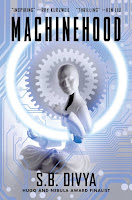Several short works by S.B. Divya have been among our favourites in the past five years or so.
 |
Image via Simon
& Schuster |
“Contingency Plans for the Apocalypse,” “Loss of Signal,” and the Nebula-shortlisted novella “Runtime,” demonstrate that she is a writer who delivers interesting ideas wrapped in approachable and stylish prose. We therefore had high hopes for her debut novel
Machinehood — and were not disappointed.
The novel is clever, brimming with engaging ideas, and provides important commentary on current political trends. Set a century down the line,
Machinehood delves into the erosion of human rights, the perils of capital-driven pharmaceutical development, and the evolving understandings of privacy.
Machinehood centres on Welga, a security contractor who ends up investigating a series of terrorist attacks thought to be orchestrated by the world’s first truly sentient artificial intelligence. Although the story initially feels like an adventure novel, it’s soon apparent that the story centers on Welga’s quest to create stability, the precariousness of her work situation, and her sister-in-law’s medical investigation into seizures that Welga begins experiencing.
Divya uses these narrative threads to explore how capitalist-driven competition can lead to negative outcomes for society. In particular, the use of performance-enhancing drugs has been normalized in this future, leading to workers whose employment is contingent on their willingness to punish their bodies and nervous systems beyond their natural limits. While this is a bleak (and unfortunately believable) aspect to the world Divya has crafted, it is not entirely dystopian.
While the novel depicts various forms of body modification having detrimental effects, and the gig economy making working relationships more tenuous, other advances such as automatic kitchens, the ease of global travel, and medical printers have created higher standards of living in other ways. This is a nuanced future that avoids monocausal explanations for society’s changes.
 |
Escape Pod co-host
S.B. Divya's engineering
background is evident.
Image via Analog |
One of the recurring themes explored in the book — and one of the reasons it should be considered for the Prometheus Award — is the relationship between government services, the private sector, and do-it-yourself culture. As an example, those wanting to go to space do so through the participation of voluntary hobbyist rocket-ship clubs, while health care is allocated through a system of micro-auctions. Pharmaceuticals are often printed at home with some government oversight, but pill designs come from both giant corporations and from hobbyists. None of these details are delivered by way of polemic, but rather flow naturally within the story.
In such a setting, the most powerful actors seem to be religions, in part because of the unassailable sway they have over their followers. Without giving too much away, there are philosophical aspects to a religion of Neo-Budhism that provide incredible motivations to some of the religion’s adherents. Religion thus is shown to be a tool to navigate and instigate change.
One of the greatest strengths of the novel is that as it progresses, the conflict becomes less and less black-and-white. The antagonist is compelling in large part because it’s easy to see their side of the issues, even though their tactics aren’t acceptable. Has the terrorism perpetrated by the
Machinehood improved the lives of humanity? Divya has the courage to leave that question unanswered.
Every few years, it starts to seem like science fiction is running out of ideas. Thankfully, authors like Divya remind us that the future has an almost infinite array of possibilities.
Machinehood is the type of novel that gives us faith in science fiction as a genre.



